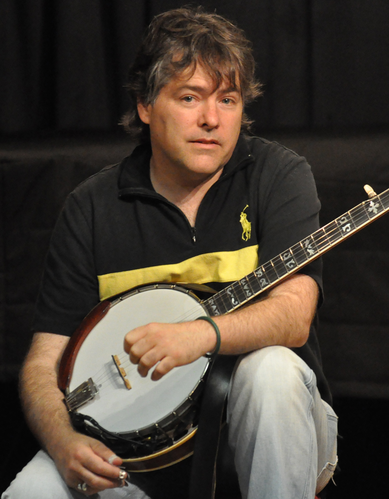Banjo Vagabond

Béla Fleck's banjo has never tied him to a single musical genre.
Photo by Phil Farnsworth

Fleck plays tunes from his recent documentary, <em>Throw Down Your Heart</em>.
Photo by Phil Farnsworth

Matt Glaser, artistic director of Berklee's American Roots Music Program, ribs (and occasionally listens to) his old bandmate.
Photo by Phil Farnsworth

The clinic draws faculty and staff beyond the Acoustic String Festival—like Adam Olenn from Institutional Advancement.
Photo by Phil Farnsworth
Some great musicians find what they're good at and stick right there. Not Béla Fleck. This groundbreaking banjoist isn't afraid to become a beginner again. When his band the Flecktones took a break, he decided to bring his American banjo experience to the many genres of Africa.
His trip around the continent was captured in the new documentary Throw Down Your Heart. Fleck was in town to promote the film; he came to Berklee as a favor to emcee/professor Matt Glaser, his bandmate 30 years ago.
The event was part of the summer Acoustic String Festival and an unofficial kickoff for the college's new American Roots Music Program. Glaser directs the program; Fleck is on the advisory board. The young string players in the audience—some at Berklee for the first time—were thrilled.
Fleck started off by giving them practical advice. "There's a lot more to being a good musician than sitting in a room by yourself," he said. Even practicing should be tuneful, he said: "Play scales in a musical way."
He soon segued to bigger questions, urging players to follow their instincts. He cited his old friend Andy Statman, who turned from bluegrass mandolin to klezmer clarinet.
"When you hear something that really turns you on—that's a cue," Fleck said. "It's probably something you'll be good at. Because usually your inner voice is right."
Fleck's inner voice has led him to bluegrass, progressive fusion, jazz, classical and, now, African genres.
"I'm a bit of a dabbler," he said. Because few forms of music use the banjo, he said, "I feel there are some opportunities I have to do some things that haven't been done."
Cellist Estefania Soto Reyes, 16, said afterwards that she found Fleck's breadth inspiring. "I want to do that," she said. "I want to be able to play everything the cello can."
Still, having enthusiasm for musical experimentation doesn't make it easy to spar with a virtuoso like Chick Corea, as Fleck did for the 2007 album The Enchantment. "That was very intimidating," he admitted. "He said, 'Play what you play and I'll make it work.'" With that assurance, Fleck let go of "the ego of wanting to hang in there with Chick Corea," he said. "I really couldn't."
He took that combination of curiosity and flexibility to Africa. So committed was Fleck to the trip that he funded it himself after his record label dropped out.
Bluegrassers often throw around the fact that the banjo comes from Africa. To be precise, different countries have any number of banjo-like instruments, Fleck said, including the Malian ngoni and the Gambian akonting.
For Throw Down Your Heart and its accompanying album, Fleck traveled to Gambia, Mali, Uganda, and Tanzania. At the end of five weeks, he had recorded about 40 songs—more than one per day.
No small challenge. He would hear a tune in what seemed like jig time, Fleck said—and then notice the drummer's toes tapping one beat off. He played a Malian marimba song to illustrate. The results sounded Appalachian at times but, as cello professor Eugene Friesen commented, also "caught the color of the kora."
This was a piece Fleck had a hard time learning, he said. "I can't even tell you how [the original] goes, because I can't tap out that rhythm." However, he's made that version his own. "I'm definitely in it now," he said. "The more I get inside it, the more it becomes a tune that I know."
(In response to a question about adapting different genres for his instrument, he said he's usually drawn to tunes that will work. "If you like the banjo, you kind of like fast, rippling stuff," he said. "I'm not trying to play 'Adagio for Strings.'")
For Fleck, it seems, every year brings a new challenge. A student asked if someday, he would no longer worry about whether he was any good. No such luck for Fleck. "I'm a worrier," he said. "But I try to use it as fuel." He added, pensively, "I never met my father, so that's the kind of thing that leaves a kid with [less of a] sense of self-worth."
Looking forward, he has lots of projects, he said. He might take the Throw Down Your Heart concept to new countries. And he's still a Flecktone. A recent lineup change, he said, put them back into "reinvention mode . . . which I love."
For now, he's bringing a number of musicians from the documentary to play shows with him, including Toumani Diabate, Oumou Sangare, and the band Ngoni Ba.
From there, he'll follow his heart wherever it lands.
